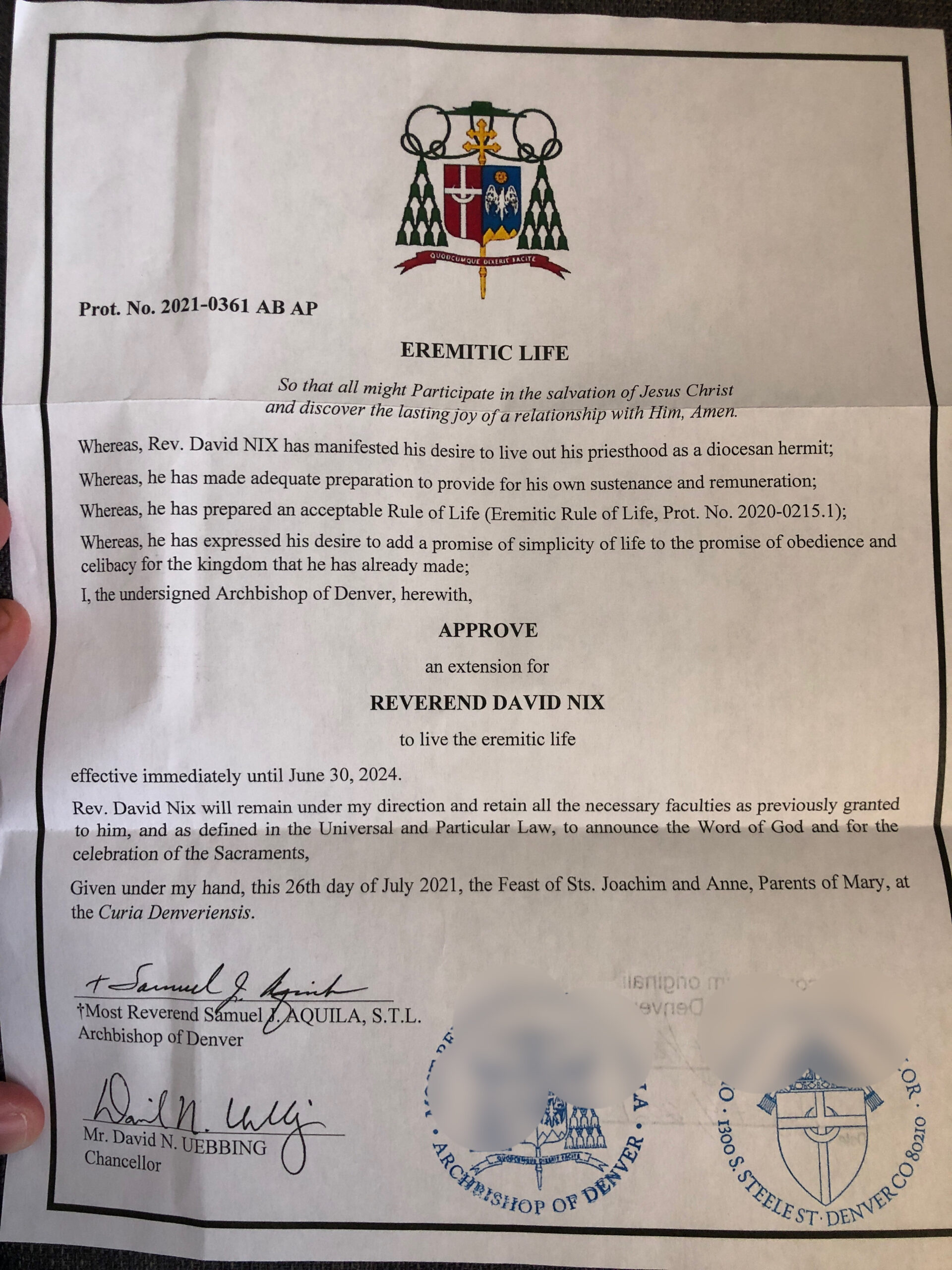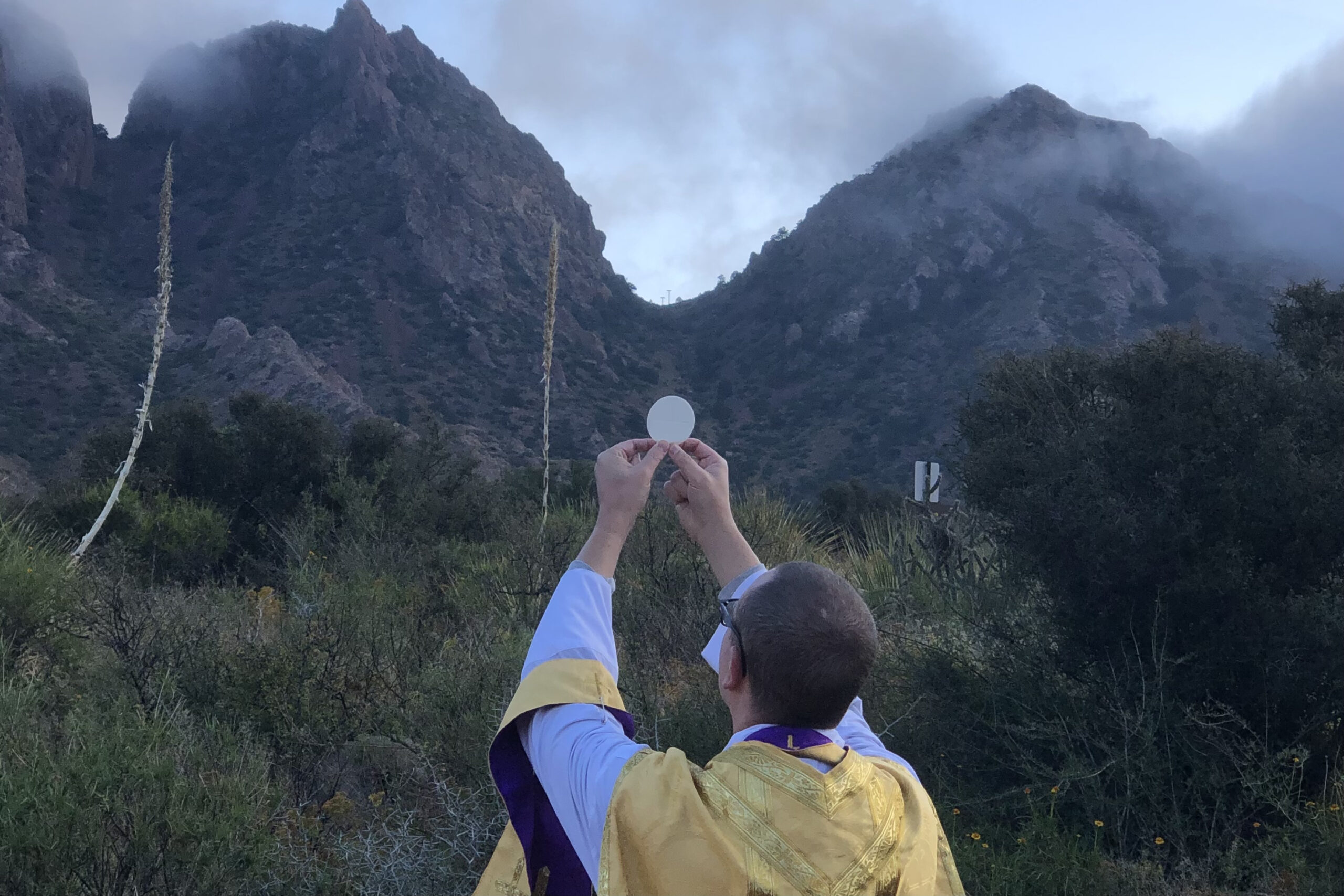
The above is the renewal of my rule of life under the Archdiocese of Denver from 26 July 2021 to 30 June 2024. I blurred out my chancery’s seal so as to prevent online hackers from copying it. But more interesting: Notice that first date in reference to the life of the Latin Mass world in the Church.
Now, some people ask me: Why does a hermit maintain some external apostolates? Isn’t this more the life of a monk-missionary than a hermit? Yes. But I give two reasons here:
1) I struggle with insomnia, I may do my several hours of prayer one day at a different time from the next day. That is why in my rule of life below (again, approved by my Archdiocese) I fulfill my prayer but the horarium (schedule for someone in religion) is a floating horarium. Notice the use of the word ideal below. That way, I am not in mortal sin for not perfectly fulfilling scheduling goals as some religious might be. But notice that I do pray several hours a day, even when on the road.
2) I need some exterior apostolate besides only the interior life, I have written into my rule of life 20 days of prayer and about 10 days of ministry. This is why I can be on-loan at times to other dioceses to help with sacraments. Thus, I am more active than most hermits, but it has been agreed-upon with my diocese as seen in my rule of life, approved below (and renewed again this summer until 2024 as seen above.)
Rule of Life (approved):
Fr. David Nix (the hermit) will adhere to the following rule of life:
- Universal Law
CAN. 603 §1.† In addition to institutes of consecrated life, the Church recognizes the eremitic or anchoritic life by which the Christian faithful devote their life to the praise of God and the salvation of the world through a stricter withdrawal from the world, the silence of solitude, and assiduous prayer and penance.
- 2.† A hermit is recognized by law as one dedicated to God in consecrated life if he or she publicly professes in the hands of the diocesan bishop the three evangelical counsels, confirmed by vow or other sacred bond, and observes a proper program of living under his direction.
The Archbishop of Denver has delegated the Vicar for Clergy to supervise the hermit. To this end, the hermit will meet with the supervisor on a regular basis on a schedule to be determined by both parties.
- Life of Prayer
“I will espouse you (in faith), lead you into the desert and there I will speak to your heart.” (Hosea 2:16, 22)
The hermitage is a sacred place, a real house of prayer and silence where one may “Be still and know that I am God” (Psalm 46:10).
- First place is given to liturgical prayer, especially Holy Mass and Communion.
- The Liturgy of the Hours will be prayed every day in its entirety.
- Mental prayer every day.
- Daily recitation of the Holy Rosary.
- An annual retreat (Canon 276, §2, #4) outside of the hermitage.
- Promise of Obedience
After the example of Christ, Who came to do the will of His Father (cf. Jn. 4:34; 5:30) and Who was obedient even ” unto death on the Cross” (Phil.2:8), the hermit will continue in obedience to the Magisterium of the Church, the Holy Father, and the Archbishop of Denver.
- Life of Simplicity
By the life of simplicity, the hermit will renounce any possessions of luxurious material goods. Where poverty is having less than one needs, simplicity is having only what one needs.
- Promise of Chastity
The hermit will continue in his promise of chastity made at ordination, which commits him to perfect continence for the Kingdom of God. Mind, heart, and body are offered wholly and exclusively to the Lord. Prayer, mortification, work, recreation, rest, wisely harmonized, are an indispensable aid to a life of well-ordered and serene chastity.
- Life of Marian Consecration
The hermit will continue in his total consecration to the Blessed Virgin Mary according to St. Louis Marie de Montfort and St. Maximilian Kolbe. The goal is to live in unlimited consecration of oneself to the Immaculate as her “absolute property” to hasten the coming of the kingdom of Christ in the world.
- Life of Penance
The life of a hermit obliges a life of sacrifice and immolation, so as to be transformed into another Christ, save our fellow men, and, ” fill up those things that are wanting of the sufferings of Christ” (Col, 1:24), expiating our sins and those of others.
The first penance to practice is sacramental penance. Sacramental penance should be received no less than every two weeks in order to gain all indulgences. Spiritual direction should be sought in order to progress safely on the road to holiness.
Penitential times, fasting, and abstinence appointed by the Church are to be observed. A life of penance means a program lived out with continual sacrifices great and small for the love of God.
The ideals would be:
- rising early in the morning;
- silence preserved with all care;
- being a goodworker, even at the humblest task;
- having plain, unpretentious food at meals, except when fed by benefactors or families at their own decision of generosity.
- taking sufficient rest, but not more than needed;
- wearing the habit;
- bearing discomforts and dislikes with serenity;
- offering to God sufferings and trials of sickness;
- Apostolates and Other Ministries
Keeping with the simplicity and inherit solitude of the eremitic life, the hermit will cautiously monitor the amount of time, energy, and outside contact that is made in person or by means of technology. That said, from time to time it is understood that the hermit may accept requests for baptisms, confessions or Traditional Latin Masses in the Archdiocese of Denver as needed by the bishops and/or deans of the diocese or individual priests. Further, the hermit may engage in apostolates such as street-walking with miraculous medals, pro-life work in doing sidewalk counselling at the abortion centers, etc. A time balance of 20 days of isolation and 10 days of apostolate work will be sought.
- Horarium
4:50 am- Rise
5:15 am- Matins
6:15 am- Lauds
7:00 am- Mass
8:00 am- Prime
9:00 am- Mental Prayer
10:00 am- Terce
11:15 am- Study or Work
12:50 pm- Sext
1:00 pm- Main Meal
2:35 pm- None
3:00 pm- Manual Labor and/or Apostolate
6:00 pm- Vespers
6:30 pm- Silent Prayer
7:00 pm- Mental Prayer
8:25 pm- Compline
